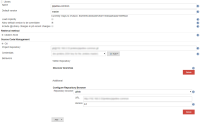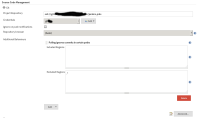-
Type:
Bug
-
Resolution: Unresolved
-
Priority:
Major
-
Component/s: workflow-cps-global-lib-plugin
-
Environment:linux rhel7.2
jenkins 2.19.2
up to date 'workflow' set of plugins (on stable update center)
I have this situation where :
- I have some jobs that gets sources from a SCM, and performs a 'poll SCM' hourly
- I have a 'global pipeline lib' defined, on another SCM (doesn't matter really, what atters is it's not in the same source tree s the jobs)
My issue is that any commit to the 'global pipeline lib' SCM will be detected by all the jobs that have a 'poll SCM' configured.
I wish I can exclude the global lib from polling.
(and yes, I know, polling is evil, whenever I can I have triggers configured on modern scm to push jobs, but sometimes it's just not possible, believe me you don't want to know all the why's)
- duplicates
-
JENKINS-38679 Constant builds when svn url contains parameter
-
- Open
-
-
JENKINS-41497 Poll SCM and Timer triggers include "Changes" for a Pipeline for any/all Shared Libraries
-
- Reopened
-
- relates to
-
JENKINS-71127 "libraries" directive is not documented
-
- Open
-
-
JENKINS-47756 GitHub plugin triggers builds when changes pushed to global pipeline
-
- Resolved
-


